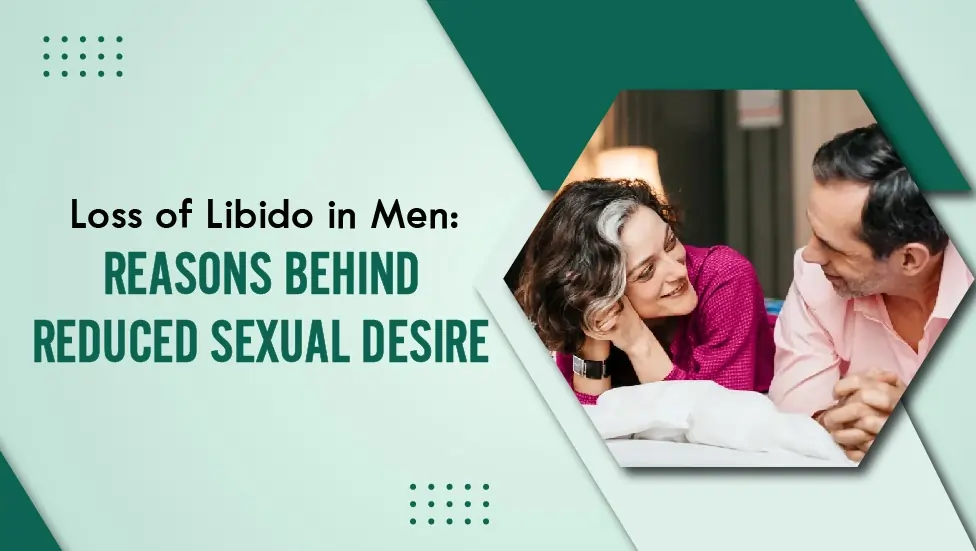It is also important to mention about loss of libido in men that is a sexual desire – one of the components of man’s health. It cannot be equated to lust; but it has deeper meaning because it concerns the man’s emotions, his psychological health, and his physical well-being. However, there are certain periods in the lives of many men when their libido rates are low. Of course, one can have down moments, but when this lack of desire becomes like this, it impacts not only the subject but also their partners. There might be many causes for this loss; some causes are physical, some psychological, and some related to lifestyle. This blog will discuss factors that lead to low libido as well as how best to manage it.
Causes of Loss of Libido in Men
In men, loss of libido may be attributed to one or a number of factors.
Physical Factors
However, it is vital for any man to know that most times, low libido begins with physical alterations. It is a perfect fact that aging and certain chronic diseases and even certain drugs have some impact on sexual desire.
Hormonal Imbalances: Erectile potency is perhaps the most familiar aspect of male sexual function, and testosterone is the hormone most commonly linked to it. The reduction in testosterone is common with aging, though some aging men have a steep drop in their hormone levels. Testosterone deficiency may lead to erectile dysfunction and therefore low sexual desire.
Medications: There are drugs that, slowly but steadily, sap your desire for sex or remain hidden while doing the same thing. Anti-depressant drugs, for blood pressure or any ordinary medications may also have side effects on sexual desire.
Chronic Health Conditions: Diabetic, heart disease, obesity, and other such diseases pose not only the energy affected but also one’s libido. These conditions make sex tiring, alter body image, and also affect the blood circulation and so the desire for sex.
Psychological Factors
Much as we may think physical problems are the only cause for low libido, we are wrong. It means that mental and emotional factors can also be equally effective.
Stress and Anxiety: Stress often occupies an important place in people’s lives, and we can state that everyone is under pressure. Whether the source of stress is pecuniary, job-related, or familial, such stress devours much cognitive real estate that sex becomes merely a chore load on the list.
Depression: It’s more than the ordinary low spirit; it seeps into your entire life system down to your sex life. Depressed male partners may feel like they are losing touch with both self and other. Sex and other forms of enjoyment may seem like pipe dreams.
Relationship Issues: In other cases, low libido is caused not by internal factors but by relationship problems. Every complicated relation, unhealthy relation, unsolved issues, or no proper communication and sometimes even lack of emotional closeness can hinder physical gratification.
Lifestyle Factors
Most of the time, what we think is a mere lifestyle affects our health deeply. A number of factors which include dietary habits, exercise regimes, and other lifestyle choices clearly affect libido.
Poor Diet and Nutrition: If one or both of the two is always on fast food or processed snacks, it’s likely that it is affecting more than just the belly. This is because diets full of sugar and unhealthy fats make you feel listless, lethargic, and, no kidding, unmotivated to ‘get busy’
Lack of Exercise: As people hailing the importance of exercise for a healthy lifestyle know, exercise is not only good for your figure but has numerous advantages across the board. It fatigue busts, enhances heartbeat and blood flow which are critical for a good sexual appetite.
When to Seek Medical Advice for loss of libido in men
Lack of sexual desire, as all other symptoms, may indicate that something is wrong in one’s physical, psychological, or interpersonal self. The situation is alarming when the loss of libido is intense or lasts for extended time spans. Decreased sex drive together with other signs such as tiredness or changes in personality may be a sign of hormonal issues or other health problems.
Conclusion
Impotence is normal with aging, but it is not the ultimate conclusion that every male will have to undergo. Knowing what in essence is at the root of the problem—either a medical, psychological, or a lifestyle concern—you can start seeing a solution and enjoy great and active sex again. Talking with one’s partner about the issue and consulting a doctor when needed is an important part of the process. The important message here is that one can have a good sexual life even if it needs assistance to achieve a healthy one.









